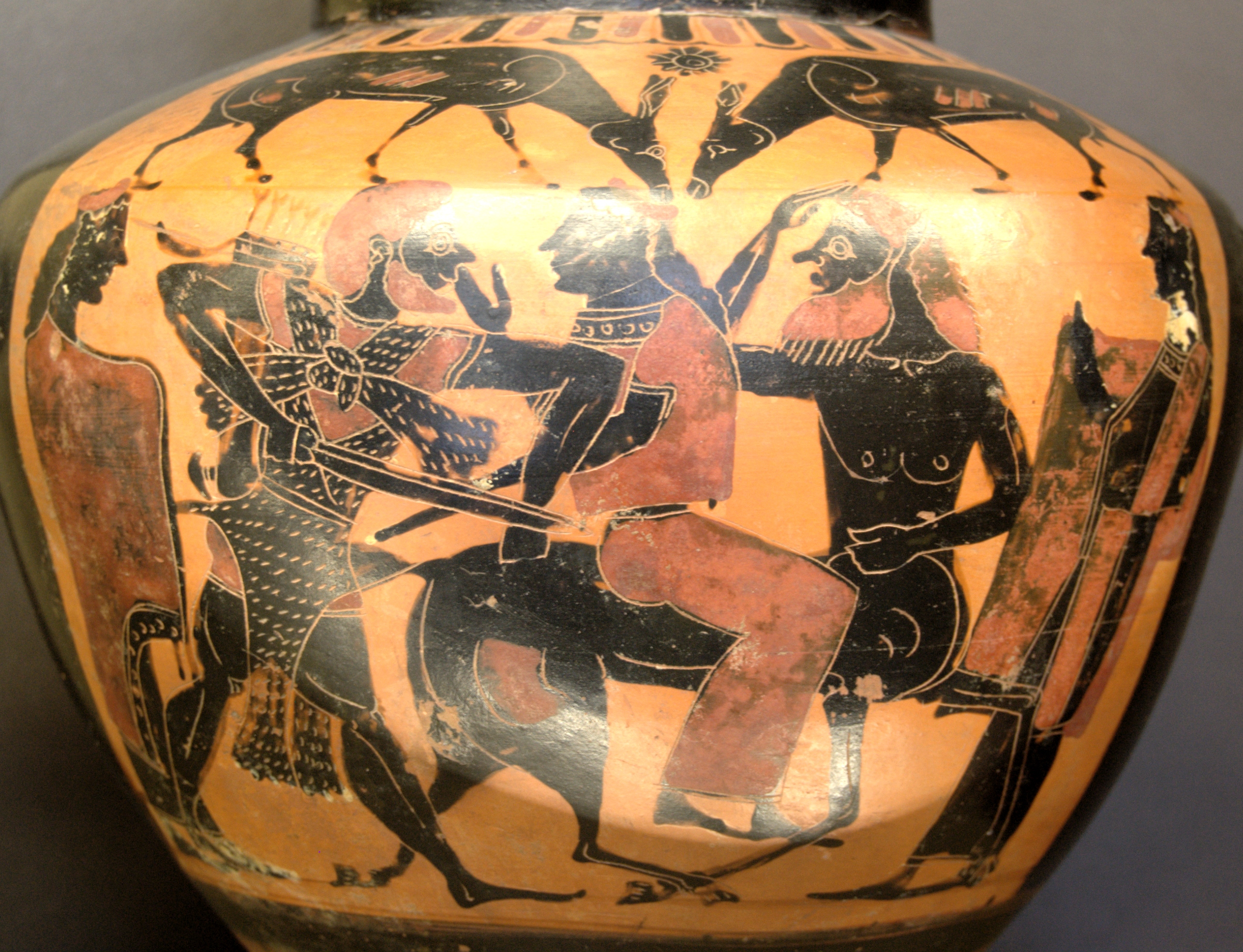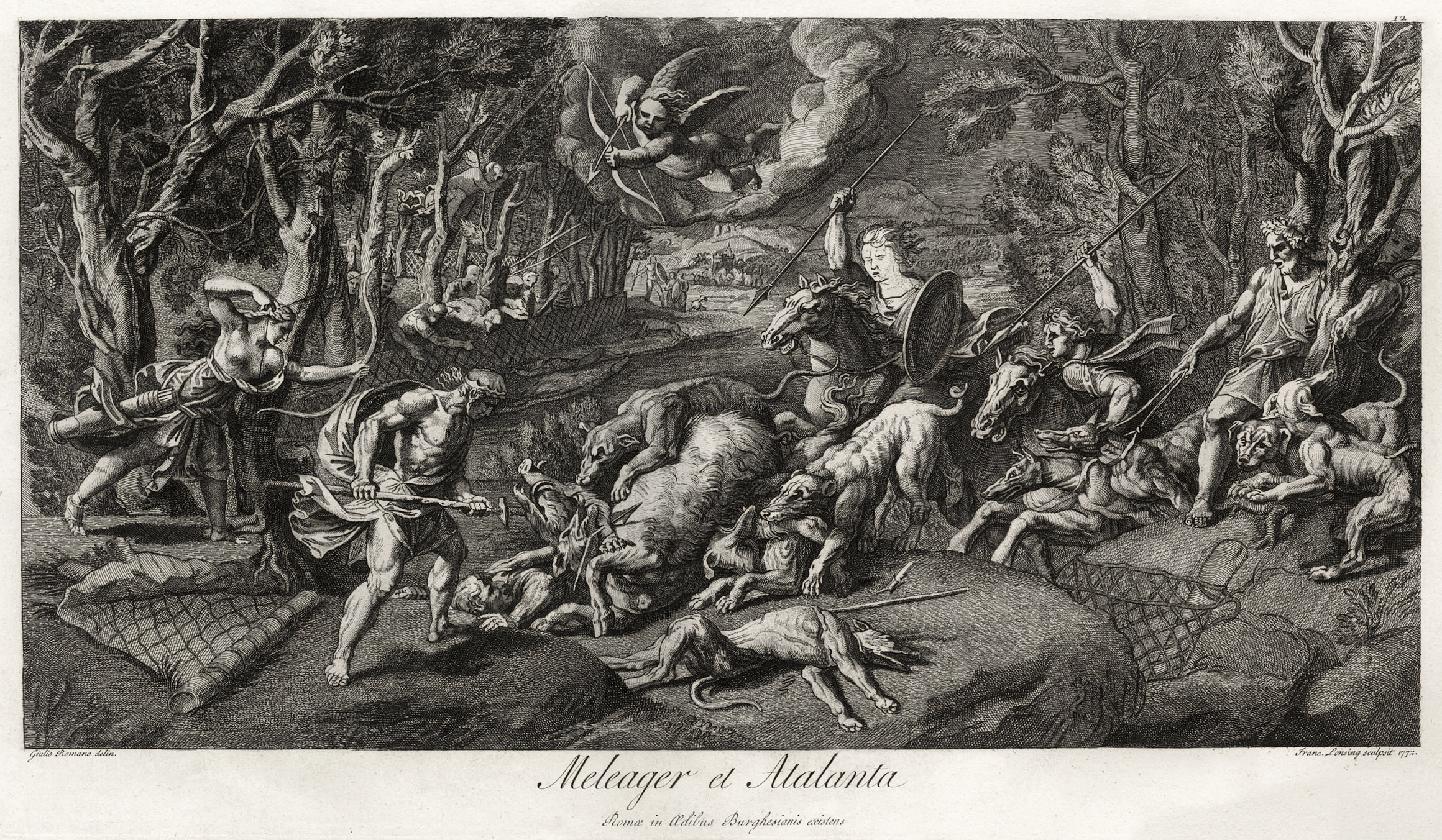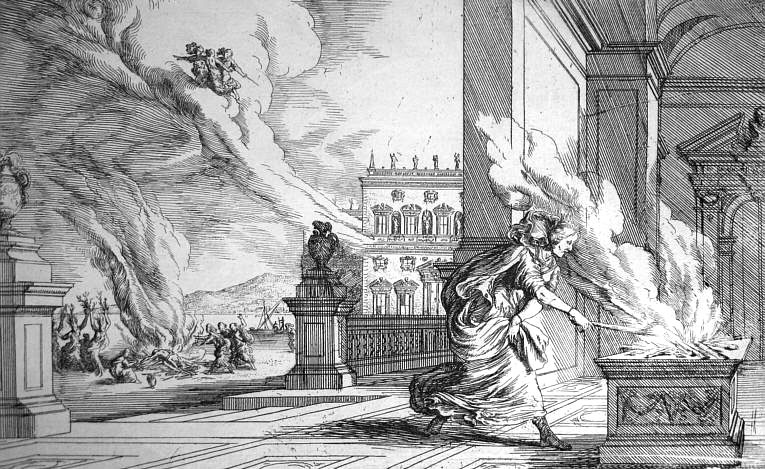|
Toxeus
In Greek mythology, the name Toxeus or Toxius (Ancient Greek: Τοξεύς means "bowman") refers to the following individuals: *Toxius, son of Caelus (Uranus) who was the inventor of building with clay, it having been suggested to him from swallows' nests. *Toxeus, a Pleuronian prince as the son of King Thestius and thus, brother of Althaea. He participated in the hunt for the Calydonian Boar but was angry that the prize of the boar's hide had been given to a woman (Atalanta) by his nephew Meleager, who then killed him in the ensuing argument. *Toxeus, a Calydonian prince as the son of King Oeneus and Althaea (which makes him a nephew of the above Toxeus). He was the brother of Meleager, Clymenus, Periphas, Agelaus (or Ageleus), Thyreus (or Phereus or Pheres), Deianeira, Gorge, Eurymede and Melanippe.Antoninus Liberalis2as cited in Nicander's ''Metamorphoses'' Toxeus was killed by his father for over leaping the trench which had been dug around Calydon. (This is paralleled by ... [...More Info...] [...Related Items...] OR: [Wikipedia] [Google] [Baidu] |
Oeneus
In Greek mythology, Oeneus (; grc , Οἰνεύς , Oineús , Wine-man) was a Calydonian king. He introduced wine-making to Aetolia, which he learned from Dionysus and the first who received a vine-plant from the same god. Apollodorus1.8.1/ref> Family Oeneus was the son of King Porthaon and Euryte, and thus, brother of Agrius (son of Porthaon), Agrius, Alcathous, Melas (mythology), Melas, Leucopeus, and Sterope. He married Althaea (mythology), Althaea and became the father of Deianira, Deianeira, Meleager, Toxeus, Clymenus, Periphas, Agelaus (or Ageleus), Thyreus (mythology), Thyreus (or Phereus or Pheres), Gorge (mythology), Gorge, Eurymede, Melanippe and Perimede (mythology), Perimede (although Meleager's and Deianeira's fathers could also have been Ares and Dionysus In ancient Greek religion and myth, Dionysus (; grc, Διόνυσος ) is the god of the grape-harvest, winemaking, orchards and fruit, vegetation, fertility, insanity, ritual madness, religious ecstasy, ... [...More Info...] [...Related Items...] OR: [Wikipedia] [Google] [Baidu] |
Thestius
In Greek mythology, Thestius (; Ancient Greek: Θέστιος) was a king of Pleuronians in Aetolia. He is not to be confused with Thespius, who was sometimes referred to as "Thestius". The patronymic "Thestias" may refer to one of his daughters, Leda or Althaea, and "Thestiades" to his son Iphiclus. Family Thestius was the son either of Ares by Demonice or Pisidice,Pseudo-Plutarch, ''De fluviis'22.1/ref> or of Agenor (son of Pleuron) possibly by Epicasta. He was the brother of Evenus, Pylus and Molus or of Demonice and Porthaon instead. Thestius was the father of Iphiclus by Leucippe or Eurythemis, daughter of Cleoboea, who was the mother of his other children, Althaea,Antoninus Liberalis2as cited in Nicander's ''Metamorphoses'' Eurypylus, Evippus, Hypermnestra, Leda and Plexippus. In other sources, the mother of Iphiclus, Althaea and Leda was named either Laophonte, daughter of Pleuron or Deidameia, daughter of Perieres. Other sons of Thestius were Cometes a ... [...More Info...] [...Related Items...] OR: [Wikipedia] [Google] [Baidu] |
Deianira
Deianira, Deïanira, or Deianeira (; Ancient Greek: Δηϊάνειρα, ''Dēiáneira'', or , ''Dēáneira'', ), also known as Dejanira, is a Calydonian princess in Greek mythology whose name translates as "man-destroyer" or "destroyer of her husband". She was the wife of Heracles and, in late Classical accounts, his unwitting murderer, killing him with the poisoned Shirt of Nessus. She is the main character in Sophocles' play '' Women of Trachis''. Family Deianira was the daughter of Althaea and her husband Oeneus (whose name means "wine-man"), the king of Calydon (after the wine-god gave the king the vine to cultivate), and the half-sister of Meleager. Her other siblings were Toxeus, Clymenus, Periphas, Agelaus (or Ageleus), Thyreus (or Phereus or Pheres), Gorge, Eurymede and Melanippe. In some accounts, Deianira was the daughter of King Dexamenus of Olenus and thus, sister to Eurypylus, Theronice and Theraephone. Others called this daughter of Dexamenus as Mn ... [...More Info...] [...Related Items...] OR: [Wikipedia] [Google] [Baidu] |
Meleager
In Greek mythology A major branch of classical mythology, Greek mythology is the body of myths originally told by the ancient Greeks, and a genre of Ancient Greek folklore. These stories concern the origin and nature of the world, the lives and activities of ..., Meleager (, grc-gre, Μελέαγρος, Meléagros) was a Greek hero, hero venerated in his ''temenos'' at Calydon in Aetolia. He was already famed as the host of the Calydonian Boar, Calydonian boar hunt in the epic tradition that was reworked by Homer. Meleager is also mentioned as one of the Argonauts. Biography Meleager was a Calydonian prince as the son of Althaea (Greek mythology), Althaea and the vintner King OeneusAntoninus Liberalis2as cited in Nicander, Nicander's ''Metamorphoses'' or according to some, of the god Ares. He was the brother of Deianira, Deianeira, Toxeus, Clymenus, Periphas, Agelaus (or Ageleus), Thyreus (mythology), Thyreus (or Phereus or Pheres), Gorge (mythology), Gorge, Eurymede ... [...More Info...] [...Related Items...] OR: [Wikipedia] [Google] [Baidu] |
Calydonian Boar
The Calydonian boar hunt is one of the great heroic adventures in Greek legend. It occurred in the generation prior to that of the Trojan War, and stands alongside the other great heroic adventure of that generation, the voyage of the Argonauts, which preceded it. The purpose of the hunt was to kill the Calydonian boar (also called the Aetolian boar), which had been sent by Artemis to ravage the region of Calydon in Aetolia, because its king Oeneus had failed to honour her in his rites to the gods. The hunters, led by the hero Meleager, included many of the foremost heroes of Greece. In most accounts, it also included a great heroine, Atalanta, who won its hide by first wounding it with an arrow. This outraged some of the men, leading to a tragic dispute. Importance in Greek mythology and art Since the Calydonian boar hunt drew together numerous heroes—among whom were many who were venerated as progenitors of their local ruling houses among tribal groups of Hellenes into Cl ... [...More Info...] [...Related Items...] OR: [Wikipedia] [Google] [Baidu] |
Thyreus (mythology)
In Greek mythology, Thyreus (Ancient Greek: Θυρέα means "porter") was a Calydonian prince as the son of King Oeneus and Althaea, daughter of King Thestius of Pleuron. He was the brother of Deianeira, Meleager, Toxeus, Clymenus, Periphas, Agelaus and Gorge. Apollodorus1.8.1/ref> In some accounts, he was called as the "horse-taming" Pheres or as Phereus.Antoninus Liberalis2as cited in Nicander's ''Metamorphoses'' When the war between the Curetes and the Calydonians broke out, Thyreus along with his brothers, including Meleager, all fell during the battle.Hyginus, ''Fabulae'' 175 Notes References * Antoninus Liberalis, ''The Metamorphoses of Antoninus Liberalis'' translated by Francis Celoria (Routledge 1992)Online version at the Topos Text Project.* Apollodorus, ''The Library'' with an English Translation by Sir James George Frazer, F.B.A., F.R.S. in 2 Volumes, Cambridge, MA, Harvard University Press; London, William Heinemann Ltd. 1921. ISBN 0-674-99135-4Online versio ... [...More Info...] [...Related Items...] OR: [Wikipedia] [Google] [Baidu] |
Atalanta
Atalanta (; grc-gre, Ἀταλάντη, Atalantē) meaning "equal in weight", is a heroine in Greek mythology. There are two versions of the huntress Atalanta: one from Arcadia (region), Arcadia, whose parents were Iasus and Clymene (mythology), Clymene and who is primarily known from the tales of the Calydonian boar hunt and the Argonauts; and the other from Boeotia, who is the daughter of King Schoeneus and is primarily noted for her skill in the footrace. In both versions, Atalanta was a local figure allied to the goddess Artemis; in such oral traditions, minor characters were often assigned different names, resulting in minor regional variations. Mythology Early life At birth, Atalanta was taken to Mount Parthenion to be Infant exposure, exposed because her father had desired a son. A she-bear—one of the symbols of Artemis—whose cubs had been recently killed by hunters came upon Atalanta and nursed her until those same hunters discovered her and raised her themselves ... [...More Info...] [...Related Items...] OR: [Wikipedia] [Google] [Baidu] |
Althaea (mythology)
Althaea or Althea (; Ancient Greek: Ἀλθαία ''Althaía'' "healer" from ἀλθαίνω ''althaino'', "to cure", also "a kind of mallow") was the queen of Calydon in Greek mythology. Family Althaea was the daughter of King ThestiusAntoninus Liberalis2as cited in Nicander's ''Metamorphoses'' and Eurythemis, and was sister to Leda, Hypermnestra, Iphiclus, Euippus. She was also the wife of Oeneus, king of Calydon, and mother of sons, Meleager, Toxeus, Thyreus ( Pheres or Phereus), Clymenus, Agelaus ( Ageleus), Periphas and daughters, Deianeira, Gorge, Melanippe and Eurymede (the latter two were included in the Meleagrids). According to some writers, Meleager was the result of a liaison with the Greek god Ares, and Deianeira the progeny of Althaea and the god Dionysus. In some accounts, Ancaeus was called her son by the god Poseidon. Mythology Althaea is especially remembered in ancient story about the fate of her son Meleager; they became the cause of each oth ... [...More Info...] [...Related Items...] OR: [Wikipedia] [Google] [Baidu] |
Gorge (mythology)
In Greek mythology, Gorge( grc, Γόργη, comes from the adjective ''gorgos,'' "terrible" or "horrible") may refer to: *Gorge, a Libyan princess as one of the Danaïdes, daughters of King Danaus. Her mother was either the hamadryads Atlanteia or Phoebe and thus, probably the full sister of Hippodamia, Rhodia, Cleopatra, Asteria, Hippodamia, Glauce, Hippomedusa, Iphimedusa and Rhode. She married and murdered Hippothous, son of Aegyptus. *Gorge, a Calydonian princess as the daughter of King Oeneus and Althaea, daughter of King Thestius of Pleuron. She was the sister of Deianeira, Meleager, Toxeus, Clymenus, Periphas, Agelaus (or Ageleus), Thyreus (or Phereus or Pheres), Eurymede and Melanippe.Hesiod, ''Ehoiai'fr. 98as cited in '' Berlin Papyri'' No. 9777'';'' Antoninus Liberalis2as cited in Nicander's ''Metamorphoses'' Gorge married Andraemon and became the mother of a son Thoas who led the Aetolian contingent for the Greeks in the Trojan War. Artemis changed ... [...More Info...] [...Related Items...] OR: [Wikipedia] [Google] [Baidu] |
Eurymede
In Greek mythology, Eurymēdē (Ancient Greek: Εὐρυμήδη or Εὐρυμέδη, ''Eurumēdē,'' "lady with wide-ranging thoughts"'')'' may refer to the following characters: * Eurymēdē, mother by Glaucus of Bellerophon and possibly Deliades (Alcimenes or Piren). Otherwise, she was called Eurynome. * Eurymēdē, a Aetolian princess as daughter of King Oeneus of Calydon and Althaea, daughter of King Thestius of Pleuron. She was one of the sisters of Meleager that are called Meleagrides and who, grieving much the death of their brother, were turned into birds by Artemis. Eurymede's other siblings were Deianeira, Toxeus, Clymenus, Periphas, Agelaus (or Ageleus), Thyreus (or Phereus or Pheres), Gorge and Melanippe.Antoninus Liberalis2as cited in Nicander's ''Metamorphoses'' Notes References * Antoninus Liberalis, ''The Metamorphoses of Antoninus Liberalis'' translated by Francis Celoria (Routledge 1992)Online version at the Topos Text Project.* Apollodorus, ''Th ... [...More Info...] [...Related Items...] OR: [Wikipedia] [Google] [Baidu] |
Periphas
Periphas (; Ancient Greek: Περίφᾱς ''Períphās'' means 'conspicuousness') in Greek mythology may refer to: *Periphas, a legendary king of Attica who Zeus turned into an eagle. *Periphas, an Egyptian prince as one of the sons of King Aegyptus.Apollodorus, 2.1.5 His mother was Gorgo and thus full brother of Oeneus, Aegyptus, Menalces, Lampus and Idmon. In some accounts, he could be a son of Aegyptus either by Eurryroe, daughter of the river-god Nilus, or Isaia, daughter of King Agenor of Tyre. Periphas suffered the same fate as his other brothers, save Lynceus, when they were slain on their wedding night by their wives who obeyed the command of their father King Danaus of Libya. He married the Danaid Actaea, daughter of Danaus and Pieria. *Periphas, one of the five sons of Aretus who fought against Dionysus in the Indian War. *Periphas, a Aetolian prince as son of King Oeneus of Calydon and Althaea, daughter of King Thestius of Pleuron. He was the brother of Meleager ... [...More Info...] [...Related Items...] OR: [Wikipedia] [Google] [Baidu] |
Clymenus
In Greek mythology, Clymenus (; grc, Κλύμενος, Klúmenos} means "notorious" or "renowned") may refer to multiple individuals: *Clymenus, a son of Phoroneus by either Cerdo or Teledice or Cinna. He and his sister Chthonia founded a sanctuary of Demeter. *Clymenus was the son of Helios and king of Boeotia. In a variant genealogy, he is the father of the children of the Oceanid Merope (usually said to be the offspring of Helios and Clymene). These include Phaëton and the Heliades: Merope, Helie, Aegle, Lampetia, Phoebe, Aetherie, and Dioxippe. Sometimes Phaethousa is included in this number. The names "Clymenus" and "Merope" in Hyginus' version, which is not followed otherwise, may have resulted from incidental gender swap of the names of the Oceanid Clymene and her mortal husband Merops. *Clymenus, who killed Hodites during the fight between Phineus and Perseus. *Clymenus, son of Cardys and a descendant of Heracles of Ida. He became king of Olympia but was depose ... [...More Info...] [...Related Items...] OR: [Wikipedia] [Google] [Baidu] |



